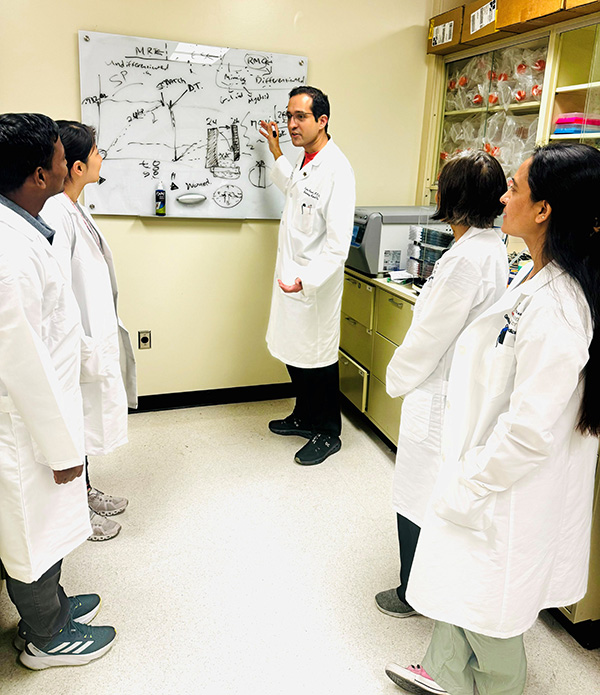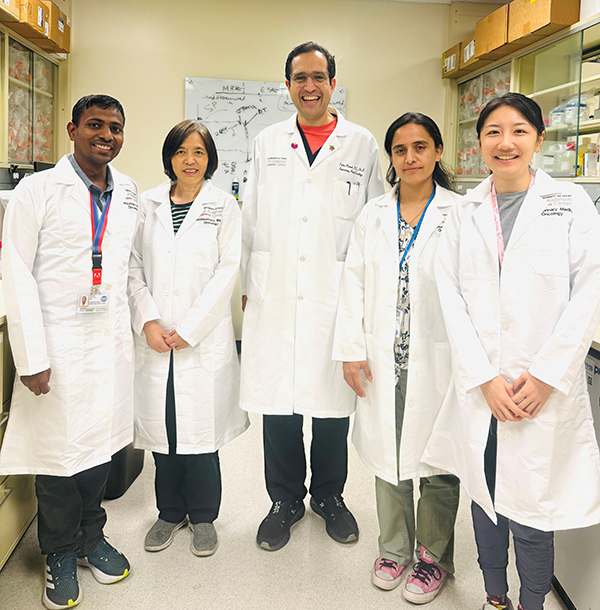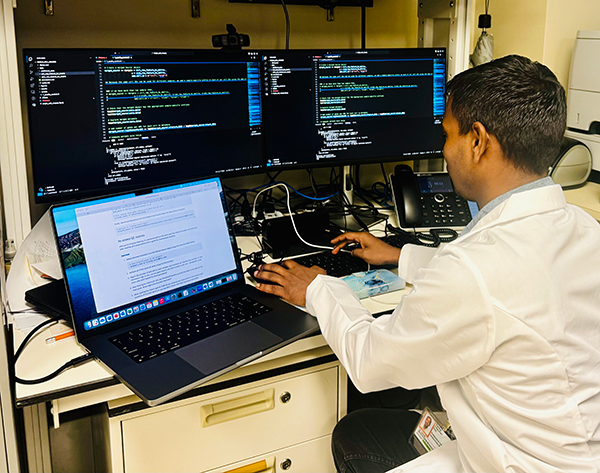A Collaborative Approach to Rare Cancers: Dr. Pavlos Msaouel
Pavlos Msaouel, M.D., Ph.D., of MD Anderson Cancer Center has taken a collaborative approach at diving deeper into a rare cancer: renal medullary carcinoma. Dr. Msaouel’s team of all-star researchers have support from organizations including the V Foundation for Cancer Research and the Rare Cancer Research Foundation.
When Jim Valvano collaborated with ESPN to form the V Foundation, he saw an opportunity to make a big impact by funding researchers early in their careers to foster lifelong advancements.
Since that founding in 1993, the V Foundation has funded over $353 million in game-changing cancer research, with a strong commitment to supporting early career investigators. This investment has yielded tremendous results, as V funded researchers, over the course of their careers, have gone on to write 100,000 publications, been connected to 1,000 clinical trials, and received 5,500 additional grants that generated $19.5 billion in cancer research.
Researchers funded by the V Foundation are the best of the best, leading long, successful careers and pioneering groundbreaking research after their initial investment from the V.
The world-class experts in our Scientific Advisory Committee select grant recipients through a highly competitive process. One of these researchers is Pavlos Msaouel, M.D., Ph.D., of MD Anderson Cancer Center.

Dr. Msaouel, a 2022 V Foundation Translational Grant recipient, focuses his research on renal medullary carcinoma (RMC), a very aggressive and rare kidney cancer. In his work, he’s seen that this type of cancer specifically afflicts young individuals of African descent, usually in their mid-20s. Because of this, Dr. Msaouel and his team worry there are many undiagnosed cases of RMC in other populations across the world.
Currently, most patients with RMC are diagnosed at stage 4, meaning the cancer has spread to other areas. Patients and their loved ones continually asked, “How could we have diagnosed this earlier?” Dr. Msaouel’s research, funded by the V Foundation, attempts to answer this question by developing a fast, affordable screening test for RMC. By deepening their understanding of the biology of this kidney cancer, Dr. Msaouel’s team hopes their new knowledge will lead to earlier diagnoses and to the development of new therapies.
“We’re very grateful for that support,” Dr. Msaouel said. “It has helped our research and it has led to meaningful results that we are very much looking forward to sharing with the scientific and patient community. One nice thing is that the knowledge that was generated is not just useful for renal medullary carcinoma, but also potentially for other rare and common diseases.”
It takes a team to win a championship, and it takes a team to support game-changing research. Researchers benefit from top-tier organizations like the V Foundation, along with others. One of the organizations that helped Dr. Msaouel deepen his understanding of RMC was the Rare Cancer Research Foundation (RCRF).

RCRF offers a unique opportunity for scientists to continue their work directly through patient support, while moving forward the progress of cancer research. The primary tool of this advancement is Pattern.org, an online patient engagement platform developed by the RCRF.
“The Rare Cancer Research Foundation is leading the way toward a collaborative patient-led approach to advancing research,” said Marshall Thompson, President of RCRF. “Our live tissue donation platform, Pattern.org, empowers rare cancer patients at any hospital in the country to donate a tissue sample directly to researchers studying their disease. This approach brings live tissue samples directly to researchers like Dr. Msaouel who have in turn made incredible findings, advanced our understanding of rare cancer, and created cell lines fueling the future of research.”
Allowing patients to donate tumor tissue and medical records after surgery offers them the opportunity to support research during their own cancer battle. Pattern.org is also building an open-source data commons, which will give researchers unprecedented access to paired clinical and molecular data on rare cancers and help build a future where every rare cancer patient has treatment options available to them.

During his research funded by the V Foundation for Cancer Research, Dr. Msaouel connected with Pattern.org and RCRF to help establish a pipeline to further continue and validate his work. While trying to develop a diagnostic test for RMC, he and his team found that the cancer expresses an antigen that is easy to test. Now that they know this protein is present, they can use this as a target for not just diagnosis or screenings, but for treatment.
“This is leading up to a clinical trial we intend to open in 2024 that will be targeting this protein,” Dr. Msaouel said. “But we’re not going to enroll only patients with RMC for that trial because we realize that there is also another rare cancer, epithelioid sarcoma” [that could be affected]. Testing therapies for patients of both RMC and epithelioid sarcoma is a prime example of how knowledge gained from one disease can help patients with other cancers as well.
The incredible work of Dr. Msaouel and other innovative researchers will continue to move us toward Victory Over Cancer® for all types of cancer. And this meaningful work could not be done without a team behind them, including the V Foundation for Cancer Research and the Rare Cancer Research Foundation. At the end of the day, the mission remains the same for everyone involved: advance cancer research and save lives.




